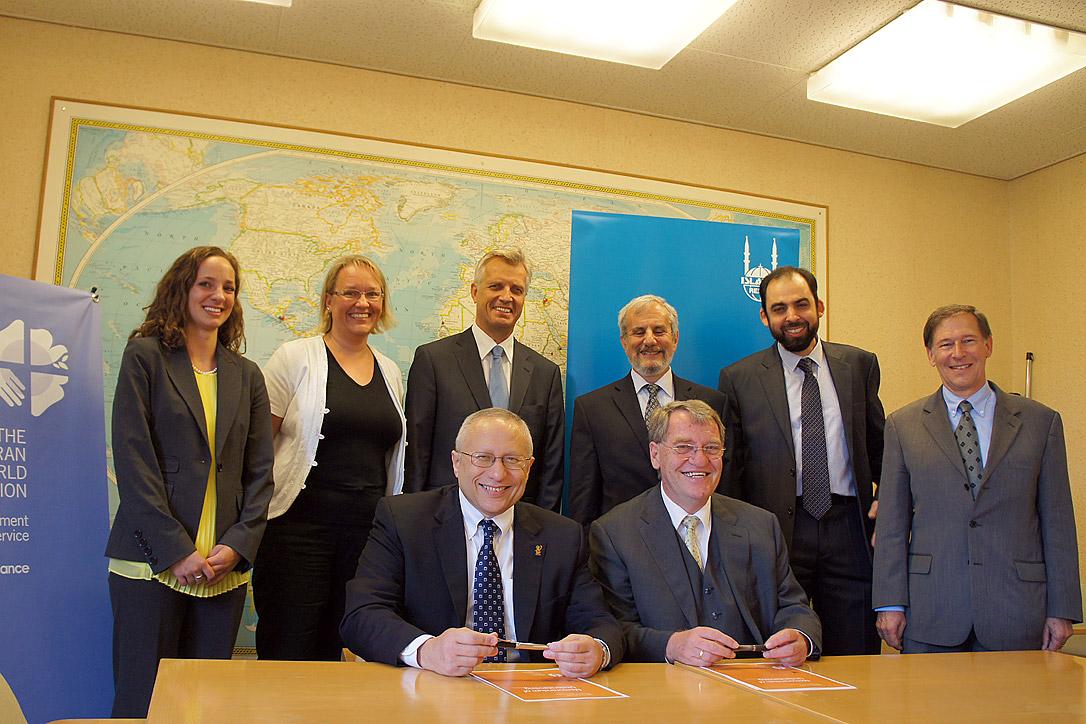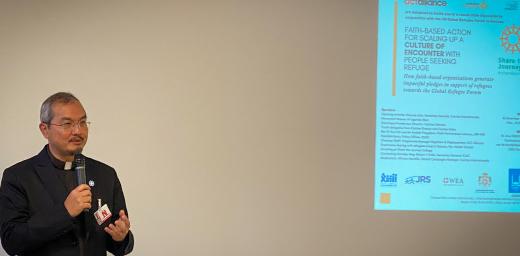LWF and Islamic Relief Sign Memorandum of Understanding

Signing of the MOU by Dr Mohamed Ashmawey, CEO of IRW and DWS Director Eberhard Hitzler (front, from left), witnessed by LWF Assistant General Secretary for Human Rights Affairs Ralston Deffenbaugh, Mehdi ben Mârad, IRW Director of National Programs, UNHCR Deputy High Commissioner Alexander Aleinikoff, LWF General Secretary Rev. Martin Junge, LWF Global program Coordinator Maria Immonen and LWF Program Assistant for Interfaith Cooperation Elizabeth Gano (from right). Photo: LWF/S. Gallay
UNHCR: “A Model for Others to Replicate”
(LWI) – The Lutheran World Federation (LWF) and Islamic Relief Worldwide (IRW) have signed a Memorandum of Understanding to cooperate in humanitarian work. The signing is the first official cooperation between a global Christian and a global Islamic humanitarian organization.
“We are proud to formalize our partnership with Islamic Relief Worldwide today”, Eberhard Hitzler, Director of the LWF Department for World Service (DWS) said. “At the heart of our collaboration are the many core values we share such as dignity, justice, compassion and commitment, and our common vision to empower and support vulnerable communities and people affected by disaster, which unite us across our religious differences”.
Religious Tradition to Care and Help
“We live in a time when our fragile world appears more disrupted by human suffering; religion is often construed as the dividing line between peoples in conflict”, Dr Mohamed Ashmawey, CEO of Islamic Relief Worldwide, added. “We believe that in these fragile times, faith-based humanitarian organisations are best prepared to provide a uniquely powerful model for mutual respect, service and cooperation for the betterment of all of humankind”.
Ashmawey also emphasized the religious roots of humanitarian work. “We have been here first” he said. “Where would people go when they were sick and hungry? They would come to the churches and mosques!”
Faith-based Needs of Refugees
The UNHCR Deputy High Commissioner, Mr Alexander Aleinikoff, praised the cooperation as exemplary. “Somewhat the secular humanitarian world has not taken enough notice of the faith-based needs of refugees” he said. “This working together is a dream coming true. You can do marvellous things together. I hope this will become a model for others to replicate”. He also asked the two organizations to give feedback on their cooperation to UNHCR.
Already, the LWF and IRW have carried out an assessment in Dadaab refugee camp, Kenya, on how best to jointly assist disabled persons who are often overlooked in refugee situations.
“This is a time when we as faith-based organizations have to say very clearly that religion is not about violence”, the LWF General Secretary Rev Martin Junge added. “This memorandum is not only about technicalities, it also touches questions of self-understanding. I am looking forward to grow in that relationship, and to bring the theological challenges of that relationship back to our member churches”.





